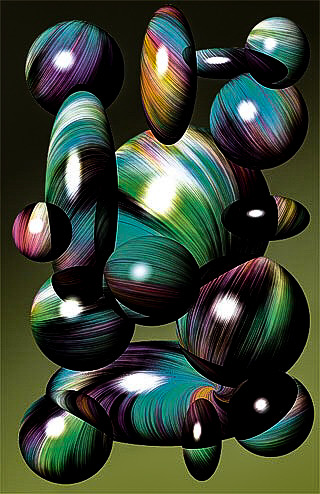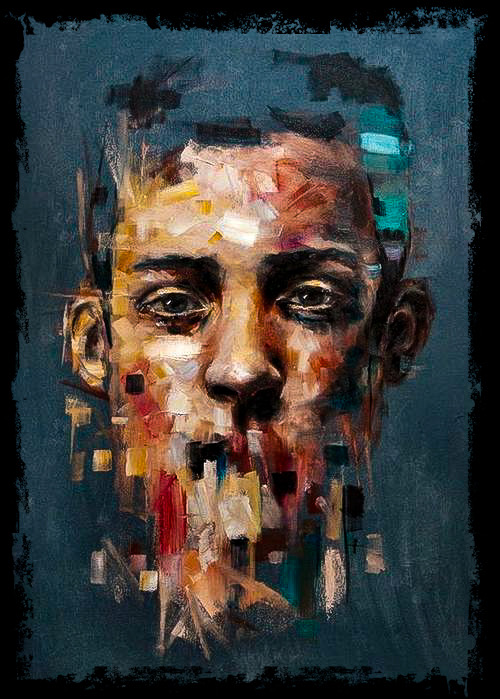
“Communing with my muse” by: rob kistner © 1985
Form does not a poem make
it’s the poet’s task to undertake
to speak to us of marvelous things
igniting the feelings mystery brings
to have mastery of the word
to speak the power to be heard
able to weave words into emotions
to unleash all of our inner notions
to captivate us from the start
to stir within our truest heart
hold us fast in wonder’s trance
coaxing us through a magic dance
but bending words to fit form’s puzzle
locks this poet into a muzzle
it then becomes problem-solving for me
not unbound heartfelt poetry
I want to paint colors that I see
and let those colors mingle free
do I seek specific form — I do not
it’s genuine feeling I‘ve always sought

*
rob kistner © 2021
Poetry at: dVerse
“Genuine feeling” indeed. The cardinal sin for we poets is the conjuring of forced or artificial emotions. Like for actors, you do not play anger, you play the situation and anger rises out of that. Both of us have been mavericks, and as Kerouac said, “outlaws of the sensorium”.
Never heard that acting advice, but it is brilliant. We have flown into the wind and swam upstream — but I’d say to fine result.
Fantastic!Poetry should be like fluid,free to flow and behave as per the poet’s wishes,not be restricted to a single form. Well penned! 🙂
Thank you Veera.
I like forms and free form, but as you say, it’s the emotion that either conveys that is important. And you always do that, Rob (and got your point across in this form). ????
Thank you Merril. This is where I was lead. I never envision a form when I begin, save for when d’Verse suggests such. Most of what I write I don’t post here, and any form a personal work of mine takes is purely happenstance.
Hmmm, you used a form to say you dislike form. Nicely done.
See how unscripted I am Ron. This wasn’t written as a form, it was written as a poem — that assumed a shape… and even rhymed. Because that’s where my muse lead me — I just followed. 🙂
The image, a painted portrait, at the end of your verse — are you the artist? It’s incredibly moving.
Thanks for sharing ~Jason
Thank you Jason. The abstract at the top id mine. The image at the bottom is there because it spoke to me — and resembles me in my teens.
The rhymes work well and the words flow freely indeed.
Ghznk you Kerfe.
Well, you made a nice form out of rebelling against the constraints of formal poetry! This fits in with the discussion we had last night. I agree with you that feeling is most important: you have to aim to reach the readers heart – which this poem most definitely does!
I can congratulate work done to serve a poetic form, even enjoy it as fine craft. But when I am looking to have my emotions stirred or stroked — I respond best when I hear it come through honestly, in plain language, unjumbled, undiluted, uncompromised, unshaped by formality. There is very little classic formal poetry that I enjoy. My favorite poet is Gary Snyder. He reaches in a wraps round my soul.
OK. Now, same the same thing in Limerick(s). I dare ya.
OK my friend. Stay tuned… 😉
I absolutely love, love this! Yes, we are “able to weave words into emotions/to unleash all of our inner notions,” and I am so utterly grateful for it. Gorgeously rendered, Rob. Thank you so much for joining in the LIVE session 🙂
I liked the poem you read Thursday Sanaa, exceptional piece. But I did miss hearing your sensuous expression. You do it so delicately well. Passion from the female soul — quite wonderful! 🙂
Agreed. The poet forms the poem.
That is the true intent at which a poem must begin. If a poem begins igh the intent to serve a specific formal poetic form, I argue you are going to get the poet as a craftsman, not as An artist. The craft might be fine, but I’d wager, if they have writing for years, their most honest intimate work lives outside a rigid formal form. “Speak to me poet, not in bundled measure, nor vaguely clever tongue, intended to impress, rather poet, speak to me in plan language, so that I might feel your honestness — your heart.”
Nice work, Rob! Although I love form, I also agree with the freedom of the message and how it wants to dress itself. It was lovely to hear you read, you have a truly marvellous resonant voice that makes it all the more compelling to listen to your words.
Wishing you well 🙂
Thank you Sunra, you are most kind… 🙂
I enjoy playing with poetry forms, but if I’m not feeling it I’ll change things up. I’m by no means a purist. I feel that expression is first and foremost when it comes to what poetry is about.
I play with forms, even enjoy it at times — but I always find that at some point I have to force the lesser, or drop the better word or phrase, because it doesn’t fit the form. Frustrating, because im the end, the piece just does not feel wholly authentic.
Bending to a form can be both forbidding or a way to find a path forward— sometimes rhymes can be like pebbles leading the poem forward, sometimes it just lead the poet into cul-de-sacs
Rhyme and form comes for me spontaneous and unnamed. I dance best with them when they arrive at the party, authentic guests and unbidden.